In an effort to increase their chances of getting something passed this legislative session, sponsors of Oregon’s e-bike rebate bill have decided to give it an extreme makeover.
When House Bill 2571 was first released in November, it was hailed as an exciting step forward by e-bike advocates and bicycle retailers across Oregon. It was a relatively simple concept that would have given e-bike buyers up to a $1,200 rebate at the point of purchase for a standard bike or $1,700 for a cargo bike. The original bill was just two pages long and was widely praised and supported at its first public hearing last month.
But since that hearing, the bill’s chief sponsor, House Representative Dacia Grayber, along with a team of advocates and policy experts, have made significant changes. The new version of the bill is six pages long and has been almost entirely re-written. New features include a provision for people with lower incomes and a larger role for the Department of Environmental Quality (DEQ).
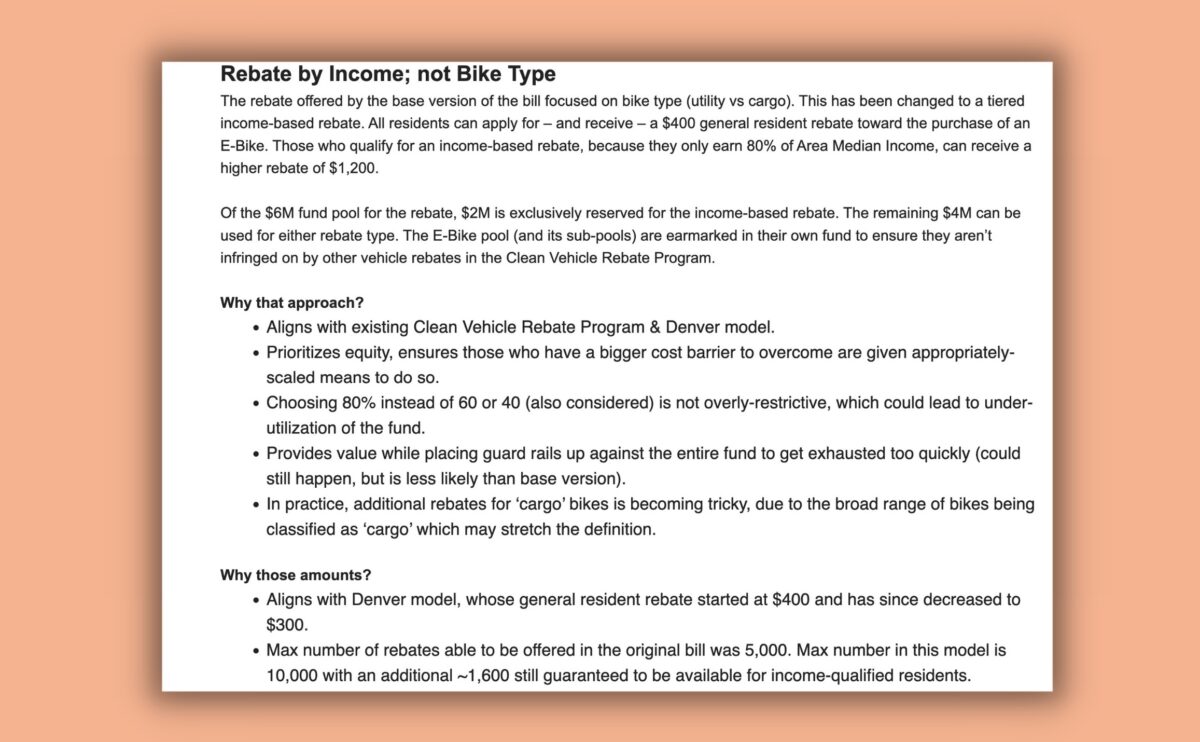
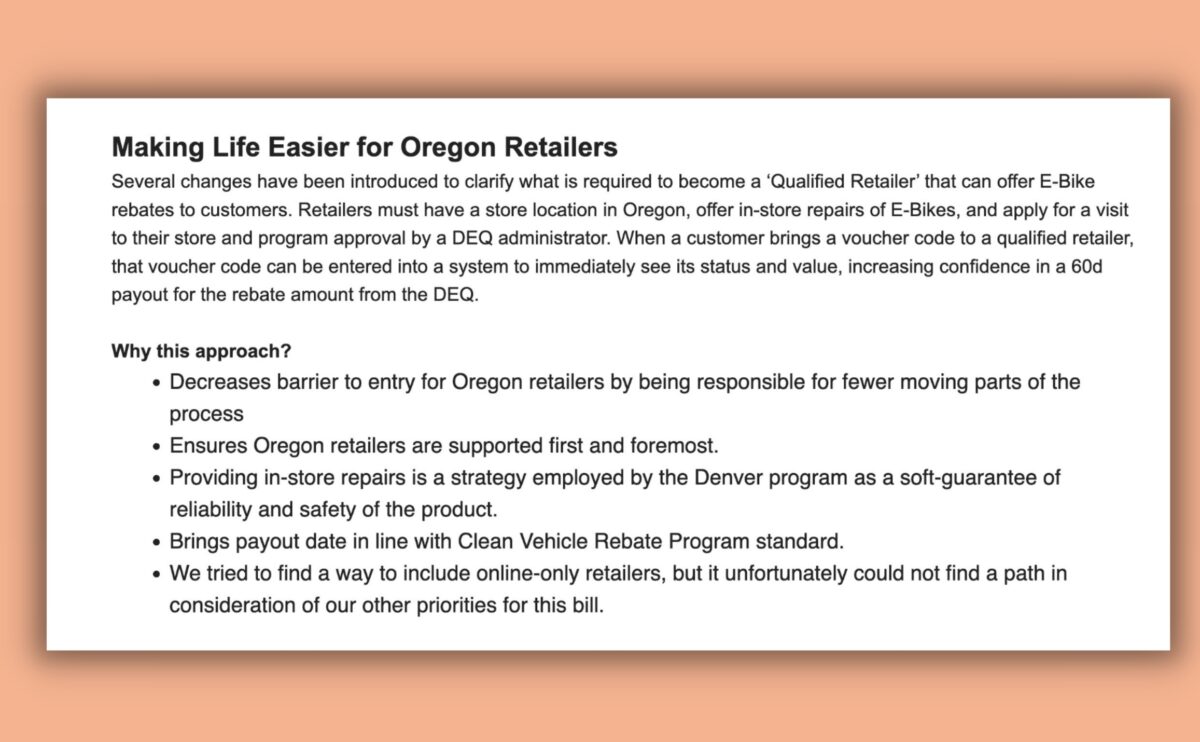

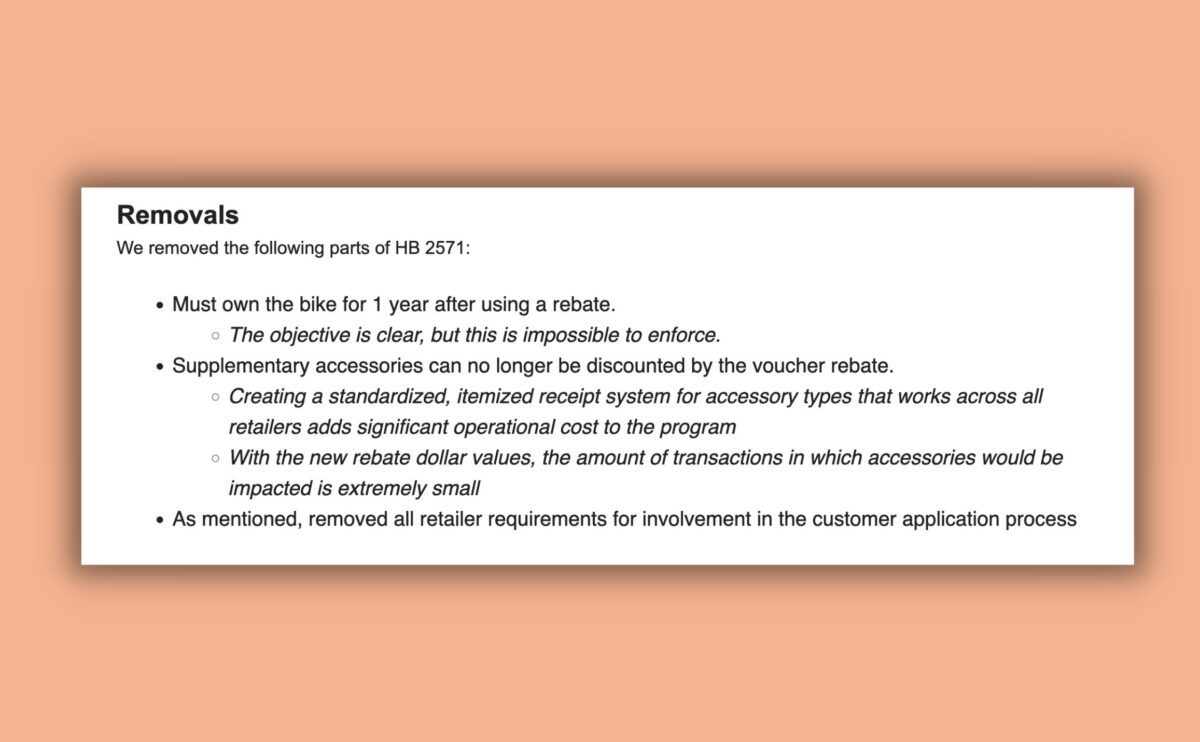
In describing the changes, Rep. Grayber’s office said their two main goals were to make the e-bike rebate an extension of Oregon’s existing Clean Vehicle Rebate Program and, where possible, model it directly after Denver’s highly successful program.
One major addition is a tiered rebate structure to offer more benefits to low-income Oregonians — something the original bill lacked. Instead of a $1,200 to $1,700 rebate to all residents, the new bill will offer $400 for general residents and $1,200 for people who make 80% of the area median income. The total dollar amount being asked for in the bill is the same — $6 million for the first two years — but $2 million of that would be reserved for the low-income rebate.
This new funding model will double the number of people who can participate in the program. The original bill would have funded a total of 5,000 rebates. The bill can now fund 10,000 rebates.
Another interesting change is how they’ve expanded the definition of the pot of money that would be used for the rebates: the Electric Bicycle Incentive Fund. The new language says the fund could accept donations.
Beyond funding changes, the mechanics of the program have changed for both residents and qualifying retailers. The amendment calls for interested residents to fill out an application for a rebate voucher with the DEQ. All customer information will be kept in a DEQ database. The original bill required bike shop employees to gather demographic data at the point-of-sale. The bill also calls for the DEQ to include a (optional) survey question on the application that would capture the buyer’s anticipated usage and riding mileage.
This switch to a more DEQ-centric program will mean a longer timeline to get your money back (not a huge surprise for anyone that understands how government works). The original bill required retailers to supply the rebate within 30 days; the new bill gives DEQ 60 days.
Speaking of retailers, if they want to participate they’ll now have to apply with DEQ to become a qualified retailer. The program would be open only to brick-and-mortar stores in Oregon and each shop must provide in-store repairs of e-bikes. Before granting an application, each store must be approved by a DEQ employee after an in-person visit and inventory review. Once in the system, a retailer would be given computer access to DEQ software that handles transactions and processes vouchers.
The other thing you will no longer find in the bill is a requirement to own the bike for at least one year (which sponsors realized was unenforceable).
While it’s likely some Oregonians will be disappointed with the changes, the new approach gives the bill a much stronger footing in terms of governance structure. It should also provide a good runway into the 2025 legislative session where it’s very likely lawmakers will pass a large transportation funding package. If the e-bike rebate program has been a success, it’s likely supporters could angle for another large funding injection in that future bill.
We’ll get a sense of what lawmakers think of the new bill at the work session (and possible vote) in the House Committee On Climate, Energy, and Environment on April 3rd.
Note: The amendments have not posted to the Oregon Legislative Information Site yet. I’ll link to them when they do.



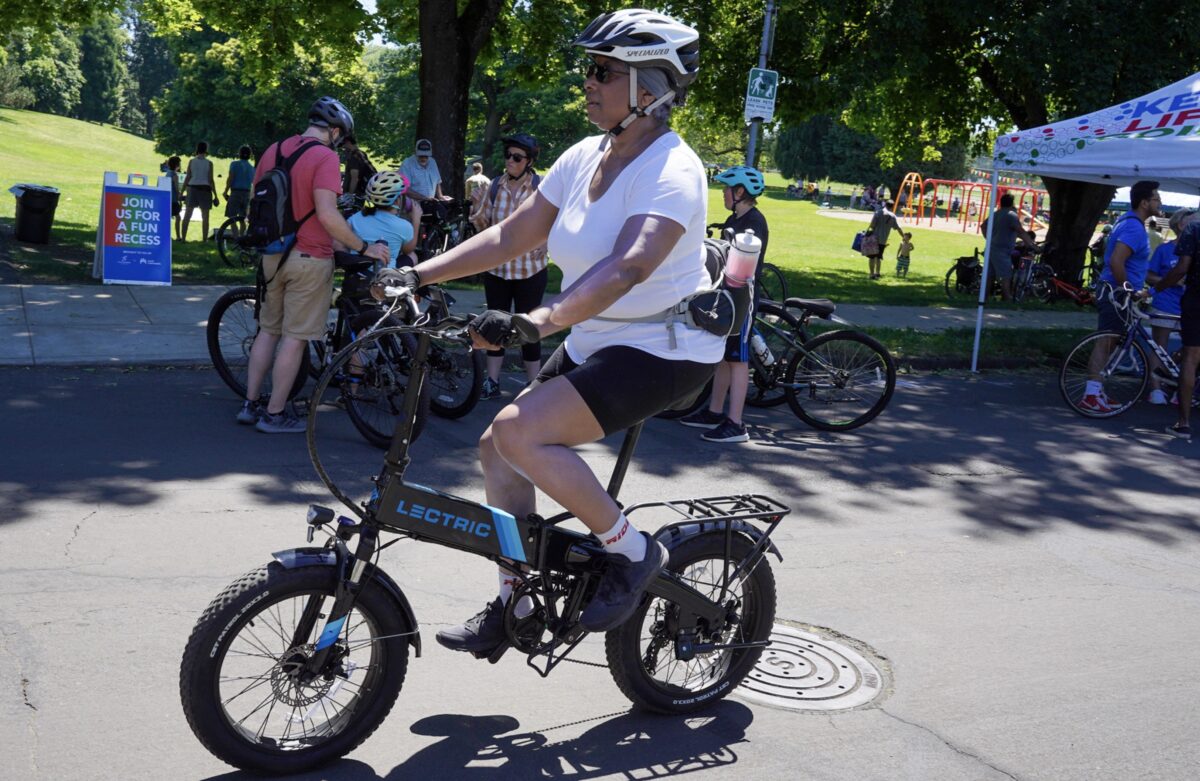

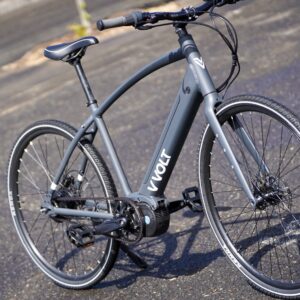

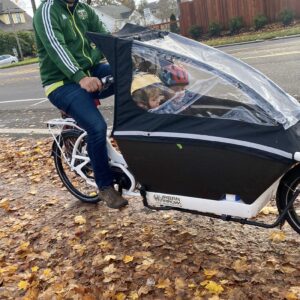
Thanks for reading.
BikePortland has served this community with independent community journalism since 2005. We rely on subscriptions from readers like you to survive. Your financial support is vital in keeping this valuable resource alive and well.
Please subscribe today to strengthen and expand our work.
I am okay with the changes. I think that the focus on brick-and-mortar stores is a win for local business and making sure that sketchier, more dangerous direct-to-consumer bikes don’t end up being bought. I’m still disappointed that it doesn’t include a rebate for regular bikes as well – but I would argue that the used market for acoustic bikes is big enough that a good commuter bike can be bought for $2-300 in most of the state.
An ebike subsidy combined with some real funding for infrastructure (especially on ODOT managed facilities) and car traffic law enforcement would be a huge boon for biking in Oregon, and possibly catapult us back to cycling mode share not seen since ~2010.
Acoustic
adjective
1.
relating to sound or the sense of hearing.
“dogs have a much greater acoustic range than humans”
2.
(of popular music or musical instruments) not having electrical amplification.
“a sad, gentle acoustic ballad”
noun
1.
the properties or qualities of a room or building that determine how sound is transmitted in it.
“Symphony Hall has perfect acoustics”
2.
the branch of physics concerned with the properties of sound.
“Tyndall lectured on acoustics”
Unless there’s a bike that is propelled using sound waves, don’t say “acoustic”.
I would like an e-bike as a means to do errands, grocery shop, and go to appointments around town. I work 100% remote so don’t need for commuting. But I won’t get one until I feel like I can park it securely which I don’t think is possible right now. I’ll take my chances tooling around in my regular inexpensive bike which wouldn’t cost me $1000’s of dollars to replace.
It is both familiar and painful to see a proposal that offers rebates to whiz-bang, high-end, flashy product variants, and no rebates/acknowledgement/social rewards for the garden variety version that accomplishes essentially the same thing and is (much) easier on the environment and our local economy, and will last much longer.
We in this country never seem willing to ask ourselves why we keep tripping over ourselves to flatter Middle Class tastes (Hybrid SUVs, Energy Star side-by-side refrigerators, SEER 16 air conditioners, etc.) but snub the modest variants and the people who buy and use those.
“snub the modest variants and the people who buy and use those.”
Who are the people who buy and use traditional bicycles? I’ve seen no data but I would bet that that population skews strongly middle class.
So, by focusing this program on low-income folks, I guess you’re right.
80% of median income is *not* low income, my friend (with the similar username). https://www.portland.gov/phb/documents/2022-income-and-rent-limits-phb/download
(somewhere between $60k/yr for one person and $85k/yr for a four person household).
Middle Class as I use the term refers not to some middle range of income but to a set of Class-bound preferences. Middle Class people have all sorts of income but being Middle Class they reliably jump on consumption bandwagons. Our regulations increasingly reify those preferences, and quite consciously refuse to subsidize what people in lower income brackets actually buy, might use.
This article may be twelve years old, but it clearly shows that it is poor people who bike at higher rates than every other quartile in the US: https://grist.org/biking/2011-04-06-race-class-and-the-demographics-of-cycling/
I am not surprised by this but since you seem to think otherwise it felt important to point this out.
If be interested to know if this holds for Portland. When I started riding here for transportation, I was definitely bottom quartile for income, even if I didn’t think of myself that way. Perhaps that skews how I see the matter.
Yeah, we’ve got a tax on actual bicycles in Oregon, at the same time we’re giving out a rebate for e-bikes?
I have an ebike, and I basically never use it – mainly because it’s just so heavy and unwieldy. (It’s like 2.5x the weigh of my normal bike.) I’m middle class (now) and pay a bunch in rent and get a garage to be able to roll the thing in and out of. That weight seems like it could be a significant issue to those without a garage looking for a safe space to store their expensive new purchase (or loading it on public transit). I just bought a nice old mountain bike for $40 from some guy who lived in an apartment – he said his landlord didn’t want him keeping the bike around. I got around for years with a $20 bike as my primary mode of transportation – kept that thing on a hook I put on the wall of my 4th floor apartment.
I think the major barrier to switching to to bikes from cars is (lack of) safe, convenient infrastructure (or even a place to lock your bike, for that matter), not lack of a motor. I think public infrastructure makes a lot more sense as a target of public dollars than buying expensive new private products for people (that the rest of the world gets along without just fine).
“Yeah, we’ve got a tax on actual bicycles in Oregon, at the same time we’re giving out a rebate for e-bikes?”
Comment of the Week for that observation.
That stinks that the rebate is not at point-of-sale and might take 60 days (probably longer given how slow bureaucracy works). This will be a big barrier to use, especially by low-income people who can’t afford to wait to get a rebate.
The incentive is still at the point of sale for the consumer – the extended reimbursement time line is for the retailer to get reimbursed. So the consumer does not wait for the benefit, once they have a voucher.
I thought the same thing as Atreus, because of this text in the article:
This pretty plainly says it’ll take 60 days to get your money. However, in the screenshots, the text seems to support your interpretation, Carrie. I think that’s a mistake in the article but I maybe misreading it.
Low income people who will still need $2000 cash to buy this new toy?
I am sure this is the first thing a person with real financial difficulties thinks is a necessity…
You added an extra 0 onto that number.
At least according to the screenshots of the changes, you need a minimum of $200 (the price after the rebate), but apparently the rebate is given to consumers at time of purchase.
$200 may still be hard to come by for the people with the most “financial difficulties”, but I promise that’s less than buying a car, which is the point of this.
E-bikes will only cost $200?
E-bikes cost $2500 to $3000, rebate is $1200, you are about $1600 short.
*** Moderator: edit out some phrases ***
I don’t care what the upper bound is (it’s not $3000), the lower bound is below $2000. The e-bike store has one for $1900. So $700 out of pocket. Clever cycles has one for about the same. REI (if they count? I don’t see why not) has several including light cargo bikes that cost at or below the minimum you would need to get the full benefit, i.e. $1400. So that would cost $200 out of pocket.
There are many many options for e-bikes that someone could get for much less than the $2000 you suggested.
And keep in mind, this should be compared to the price of a car (including its fees and upkeep/use costs).
$3000 is not the upper limit? My son owns a $4000 e-bike.. I am well aware of what they cost.
Junk e-bikes is what you recommend for the Low income people… hilarious, Portlandia ended years ago, you did not get the meme..
E-bikes are not cars.. not remotely.. people won’t ride in the rain whether the bike it is a motorbike or not. Motorcycle riders dont ride in the rain if possible.
People won’t ride with children in a cargo bike as you suggest because they are scared to death of traffic and we have no enforcement because people like you think we don’t need any.
I am starting to think you just might be a e-bike sales rep…
They are not cars, that’s the point. That’s like, the whole entire point of all of this.
Also, I have a motorcycle. I ride in the rain. Just a little FYI. Neither motorcycles or bicycles stop working when they get wet. Don’t talk to me about how people ride bikes or motorcycles, your opinion is your own.
People also ride with children in cargo bikes. I don’t know what website you think you’re on, but this one literally has regular posts from a “family biking columnist” with five young kids she hauls around town in a cargo bike. That’s just about the most difficult scenario, so it is definitely possible and she is not unique. I bike my kid around in a cargo bike.
And where in any of this did you get the idea that I don’t think we need traffic enforcement? At this point, you’re making up a guy and making up his comments and replying to that. You complain about people not knowing math and you clearly haven’t read anything I wrote (where, as it happens, I did the math and actually showed my work). You could have read my comments, thought “hmm, my assumptions are wrong” and learned something, but I guess you’re just not in the mood. It’s pointless arguing with someone like you if you don’t even respond to the actual words I wrote.
You delete “math is hard”….. I was just pointing out how ill informed the public can be about legislation… John here thinks this is a great bill because it only costs people $200 to get an e-bike.
Either he can’t read or BP does a terrible job explaining what this bill is. Maybe you will inform him that it still costs people
$2000 AFTER they get a rebate to get an e-bike.
So besides the basic unfairness of giving rebates for a “certain” kind of bicycle (or motorcycle) to certain groups, this idiotic bill would also have a DEQ person travel all around the state to all the bike shops in the state that apply for this?
That certainly sounds like NOT a waste of resources and money but now that DEQ is associated with this bill, can they quantify exactly how much a total of 10,000 motorcycles ( if all the rebates are used) will impact the air quality or overall energy usage?
Any ball park number from these scientists? Anything?
What a ridiculous waste of Oregon government resources.. Just PICK up the damn garbage or Clean up the parks and the freeways , do ANYTHING worthwhile to move the needle in this state is any positive direction…
Just ONE DAMN thing, please!
I support the thrust of brick and mortar stores to keep Amazon out of the picture.
One requirement I feel is important is to have the batteries Underwriters Lab , UL, certification. This will reduce the incidence of battery caused fires from cheap poor quality controlled battery manufactures.
We need to make sure the batteries don’t blow up or catch on fire is an excellent reason E-bikes are so environmentally friendly and well worth giving out to the public is a great argument.
The ballpark numbers are a rounding error away from 0. They’re nothing. A common 500wh battery which can take a person 30 miles (and actually, infinite miles given it’s still possible to pedal) easily is the equivalent of like making a cup of coffee or two with an electric kettle. By comparison, a small electric car (which is far more efficient than gas, but I don’t have the numbers on gas to compare directly) can generally go something like 1.88 miles on that charge (just pulling an example of a car I’ve seen that can go “up to” 90 miles on a 24Kwh battery).
So for the amount of electricity it would take to power one (small!) electric car to go a given distance, you could move at least 16 people (30/~1.88) on an e-bike.
If you then take a beater sedan that gets 30mpg which this might replace trips from, the comparison gets even more lopsided. It’s not even close.
Given that the energy isn’t generated in the city, and much of it is zero emission too, the air quality impact is positive if it displaces even one car trip.
These aren’t toys. They’re not motorcycles. They’re transportation and they scale.
And cry me a river about the DEQ person who has to go around and rubber stamp a bike shop one time ever for this. They’re just verifying that it’s an actual bike shop.
“Given that the energy isn’t generated in the city, and much of it is zero emission too, the air quality impact is positive if it displaces even one car trip.”
You are cherry picking here.
Most of our electricity in Portland is (still) generated by burning coal (Pacificorp) or Natural Gas (PGE) For both utilities the combined coal+NG share is between 65-70%.
Also. Lithium. A huge mess. Have you heard of Thacker Pass? https://www.protectthackerpass.org/
None of these fancy ‘solutions’ are free or without serious side effects. Please no more happy talk.
What, to you, is cherry picking here? I didn’t take some unrepresentative sample of data or mislead with random points. I wrote a straight forward fact. Most electricity is not generated in a city (other than excess solar) and much of the energy mix in Oregon is not carbon emitting. These are just true things without any further context needed.
Also, I think I’ve seen you mention this coal/natural gas factoid. Where are you getting your information? Anything I can find says Oregon gets less than half its electricity from coal and NG (https://www.oregon.gov/energy/energy-oregon/pages/electricity-mix-in-oregon.aspx#).
However, we don’t have to get into the weeds with that, it’s not relevant. The fact that some of the energy comes from wind and solar and hydro means it’s better than burning refined gasoline in a car in the city. The energy input needed to make the gasoline in the first place, transport it around, and the abysmal efficiency of an ICE, plus the multi-ton weight you have to move around just to mostly transport one person, make this a no brainer.
And why are you scrutinizing the source of just one particular raw material, lithium? Yeah we should do better at sourcing it, and maybe there is no nice way to get it, but your bike is made out of all sorts of things that have messy, human rights violating sources. Your bike isn’t free of planet destroying hydrocarbons, dangerous chemicals in paints, iron that was mined somewhere, and plenty of others. It’s all bad. Pointing out just the lithium and ignoring all the obvious benefits of it just seems like a fallacy. You’re just pointing at one thing because it’s different and discounting the massive advantage it has over the thing it’s meant to replace: cars on the road.
lots of straw men.
+ bikes are not equivalent to e-bikes when it comes to materials, toxicity, durability.
occasionally replacing a chain and brake pads and tubes, which is what I’ve been doing with the bike I bought thirty six years ago and use every day isn’t remotely comparable to the real-world product life of an ebike, the material footprint that such a product has.
+ and comparing anything to a car (=terrible for the environment) is really a cheap, lazy way to show that pretty much anything isn’t terrible.
as for the source of data for the fuel mix of pacificorp and pge, I just googled them yesterday. Like I said, 65-70% are generated by burning natural gas and coal. Just because you and I can pay a little more and buy wind kwhs doesn’t scale. If everyone we knew wanted to do that tomorrow or in a year it wouldn’t work; there are no wind turbines out there waiting for us to vote with our dollars.
There are no straw men. What you are doing is comparing a teeny tiny 500wh battery on an e-bike to a multi ton vehicle that continuously burns refined fossil fuels and endangers pedestrians and destroys urban landscapes. Or, as some would have it, you’re comparing it to a 50,000wh battery in an e-tank monstrosity that is even more dangerous to other road users. It’s a joke. There is no comparison.
An e-bike will last just as long as your ancient bike. They’re the same thing plus a motor and battery. The battery will last for many thousands of miles. You’re making a mountain out of a mole hill.
I’m comparing an e-bike to a car because that’s the comparison at issue here. People who already use an all pedal bike aren’t replacing that with an e-bike, and if they are it’s either because they were not going to keep riding anyway or it’s to let them ride farther and more often. So we’re talking about cars here. Cars are the comparison, don’t lose focus on that.
So you googled the energy mix of those companies. But where you and I actually get our energy, that’s less than half fossil fuel. And get this: an ICE car can only run on fossil fuels, while electricity actually can be powered by any source. Even if I believed your wild claims, and I absolutely don’t, if the electricity came from 70% fossil fuels it’s still better than driving. Because that’s 30% not fossil fuels in a vehicle that is about 1000% more efficient than a car.
You keep missing this point, on purpose I think. We are comparing to cars. Not to human power. Cars. Stay on topic. E-bikes are meant to replace some car usage. And that comparison is very easy.
Lots of sound and fury there, John.
Who appointed you the tsar who gets to decree what is and isn’t a valid comparison?
Cars – in your mind – are the relevant comparison, but I don’t happen to share that view. Cars are doomed, whether you or I or anyone likes that, agrees with that. The valid comparison I’d offer isn’t in any way tied to consumer preferences (20th Century) but to constraints (21st Century). What emissions, environmental burden, will in our best estimations allow us to avert catastrophe? Cars for everyone are out, hybrid cars for everyone are out, EVs for everyone are out. What can we really afford for everyone? Oh, right, the subject of this blog: bikes.
Bean-powered bikes, not coal+lithium powered bikes.
Hey instead of starting every comment of yours with a childish quip that is both a lie and dodges the argument, you just make your point? Maybe? Just a suggestion.
So your assertion, if I understand you, is that cars are on their way out – soon even – with no doubts. Nobody needs to do anything, no political change. They’re gone, it’s inevitable. The real question we should be talking about now, with local legislation in Oregon in 2023, is whether we very mildly incentivize something that is 99% better than driving a car or something that is 99.5% better than a car (on whatever metric you want – emissions, mining, safety, etc). Is that about right?
If you disagree with that characterization, correct me if I’m wrong. But the numbers are not wrong. You get an astronomical improvement by replacing car trips with any bike trip including e-bikes.
Color me unconvinced on any of that. Americans are clearly clinging to their cars, doubling down even. Cars are getting bigger and more dangerous. A Democrat president is expanding oil extraction. And here is a tiny little piddly bill that might help people (with a focus on low income) buy a device that they can reasonably use to go about their lives while driving less. And you come in here bleating about how they shouldn’t be making that improvement, they should be making an even more difficult improvement.
Get your priorities straight! People aren’t going to stop clinging to their cars unless they have a real alternative. There are a lot of options out there, but this is one that definitely works. This alone won’t stop climate change, no individual choices will. But in order for large systemic changes to happen we have to actually have workable alternatives.
“People aren’t going to stop clinging to their cars unless they have a real alternative.”
You are not understanding what I am saying.
You are describing a (familiar) world in which preferences reign. In the First World, so-called, we are used to this sort of arrangement: for as long as we can remember, anything we wanted and could afford we could expect, and pronto! Bananas, cars, chocolate, planes, semiconductors, saffron, gold, warships, slaves, lithium. But this has never been so for those who live in another part of the world that doesn’t have military bases in more than eighty foreign countries and has squeezed everyone to do our bidding, to allow us to always have our preferences met no matter the cost.
But there is no iron law that says this situation will or can continue indefinitely. In fact I think it very likely that it won’t. That is what I was getting at above about constraints. Sooner or later those will displace preferences as the arbiter of whether we get to all have as many new cars or chocolate bars or depleted uranium as we would like.
Both because The US empire is on the wane and because climate change. Of course it is and always has also been unjust, but that never bothered us so much. No it isn’t going to change because we see the error of our ways, or have a change of heart, but because the world is full, we’re running out, and we are about to no longer be in charge.
I heard some folks murmur about this this weekend as if the bill was ‘gutted’…
I think this bill looks great. The first iteration of HB 2571 had a notable gap in equitable impact. Restructuring to base the rebate on income really strengthens that end. I also love the requirement for brick and mortar stores to make sure this money stays WITHIN Oregon.
The other benefit to this is that it will give some precedent for when Portland sets up the PCEF e-bike rebate program (Strategic Program 6 here: https://www.portland.gov/bps/cleanenergy/climate-investment/documents/pcef-climate-investment-plan-preliminary-draft-0/download). I dont think we realize how much of an impact this program is going to have on e-bike popularity in this City…
Lastly, I think one opportunity is how to notify folks who are income-qualified. Without some form of engagement, the rebate program may not be reaching its most potential if it relies on people going to DEQ’s website on their own accord.
“I dont think we realize how much of an impact this program is going to have on e-bike popularity in this City…”
City counts reveal data behind Portland’s precipitous drop in cycling
Its very bizarre that some cycling advocates just won’t face facts about why people are not riding bikes and it has NOTHING to do with electricity…
You can tackle more than one issue, even if its not the main issue. Making e-bikes affordable is a part of a suite of solutions and one of many answers on how to get more Porltanders biking (esp Portlanders who are most vulnerable to climate change and have been left out of ‘biking’ in Portland)
What Portlanders are more vulnerable to climate change?
What are you even talking about?
Who is left out of biking?
How you turn a simple thing like riding a bicycle into some societal rant is unbelievable…
Most everyone who responded to why they don’t bike anymore
(a lot of females).simply want safe streets and paths. No one said they don’t ride because they don’t have an e-bike.
How about we fix the riding conditions first.
If the thing that changed (lets say safety issues) lowered the number of riders, clearly undoing that change should have the opposite effect. Nobody is saying otherwise.
But you are assuming that the number of riders we had before was actually the maximum number of riders we could ever hope to have. Which is just factually incorrect. We know more people could ride. We know more people want to ride. We know one of the barriers is physical ability and cargo capacity, and e-bikes address the latter issues.
We also know, regardless of any of that, one barrier to going completely car free is carrying capacity. It’s just tricky to move around one or two kids and/or groceries on a regular one person bike. But when you carry all that stuff on a big cargo bike, even your 70 going on 30 year old knees might start to complain, especially if there is anything more than a 1% grade in your path. E-bikes address that problem too.
Some people do bike, now. A lot of people, actually, in absolute numbers. Some number that we don’t know would bike if it was physically easier (i.e. an e-bike), but they’re too expensive.
Another way to look at it, we know for certainty that there are people in this city who are not deterred by whatever pet complaint you have about leaves in the bike lane or you saw a tent, and we can safely assume that some of those people are deterred by the physical requirements of riding (especially with cargo).
We don’t really know empirically what those number are, but we’ll find out with this very small, low impact pilot program that has very few downsides since people will either use the money (yay, we wanted that) or they won’t (aww, but we saved the money).
Some people do bike, now. A lot of people, actually, in absolute numbers. Some number that we don’t know would bike if it was physically easier (i.e. an e-bike), but they’re too expensive.
Another way to look at it, we know for certainty that there are people in this city who are not deterred by whatever pet complaint you have about leaves in the bike lane or you saw a tent, and we can safely assume that some of those people are deterred by the physical requirements of riding (especially with cargo).
We don’t really know empirically what those number are, but we’ll find out with this very small, low impact pilot program that has very few downsides since people will either use the money (yay, we wanted that) or they won’t (aww, but we saved the money).
It is not MY litany of complaints, there were 195 comments or so, most very sincere as to why they don’t ride bikes in Portland anymore…
For the record, I ride 5000 miles a year or so around this city on a regular bicycle and I am 70 years old so I am sick of your complaints.
It is also $10 million dollars so not a tiny amount of money and it is certainly not yours to give away John, thank you.
Cute meme you made for me, how sweet…
It’s the list of complaints you brought up here.
Just because you’re 70 and able to ride, does not mean that applies to everyone. Focus on someone other than yourself and realize different people are different. Your kind of macho “I can do it so you should too!” is not a useful way to get people riding bikes.
Glad you like the diagram though, hope it cleared things up. Sometimes a picture is worth a thousand words.
Dwk,
I nominate this for “comment of the week”! (Maybe the year).